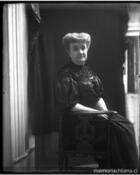
Martina Barros Borgoño, eldest daughter of Manuel Barros Arana and Eugenia Borgoño Vergara, was born in Santiago on July 6, 1850, into a family with strong political, economic and social ties.
Martina Barros shared her childhood with her brothers -Manuel, Luis and Víctor- of her in the house of her paternal grandfather, Diego Antonio Barros, until the early death of her father due to a brain disorder. Once the misfortune occurred, they moved to the home of their uncle Diego Barros Arana (1830-1907), who assumed parental responsibility and took charge of the education of the four adopted children, but, especially, of the teaching of Martina, whom he educated rigorously and methodically. This privileged upbringing for a young 19th century woman imbued her early with an environment in which history and letters were present in every conversation.
In 1874, after six years of courtship, she married Augusto Orrego Luco (1849-1933) and was renamed Martina Barros de Orrego, the name with which she appears in most of her social appearances.
Martina Barros is considered the first Chilean intellectual and one of the precursors of feminism in Chile. Although her literary activity was confined more to reading than to the production of texts, she bequeathed an important translation of John Stuart Mill's work, The subjection of women (1869), a few lectures, an article, and an extensive volume of memoirs entitled Memories of my life (1942). With these first texts, she managed to install in her social circle discussions about the education of the women of the Chilean oligarchy and the female vote, permeating the political and literary spheres of her time with these liberal concerns. With this, she was also able to open the specific discussion on the spaces of freedom and decision of women in the social horizon of the XIX century, outlining some of the changes that would begin to take shape in the political horizon of the XX.
In the 1920s, her participation in the Ladies' Club raised anger among the social and intellectual circles of the time, those who saw, in the ideas that were raised there, a threat to the stability of the home and the family, articulating institutions of the society of the time. Liberal, Catholic and self-taught, she participated in the few spaces for cultural exchange at the time, salons and gatherings, and later, given the decline of these practices, she also collaborated with the Academy of Letters of the Catholic University.
The bet of the liberal feminism of Martina Barros advocated the liberation of women through the concrete demand for an education that is not differentiated between men and women, since, on the path towards equality, it was conceived, first, as a necessary step, "educate oneself to be free" (Castillo, Alejandra. "The aporias of a liberal feminism." In Barros, Martina. Prologue to the Slavery of Women. Santiago: Palinodia, 2009, p. 10).
Barros's aspirations succeeded in sowing in the intellectual elite of the time a concern that until then had not been actively and systematically problematized publicly. In this sense, Martina Barros contributed to generating discursive conditions so that the itch for autonomy and gender awareness would gain strength and bear fruit in the first movements of women's social and political demands at the beginning of the 20th century.




